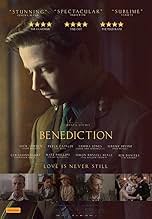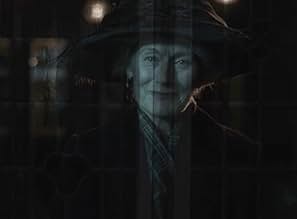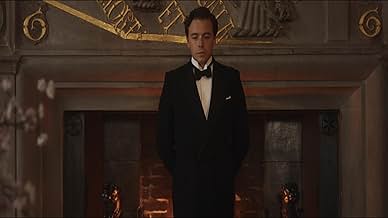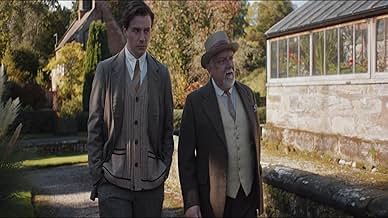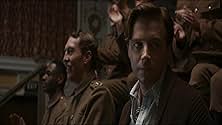La ricerca della salvezza personale del leggendario poeta di guerra del 20° secolo Siegfried Sassoon attraverso le sue esperienze con la famiglia, la guerra e i suoi scritti.La ricerca della salvezza personale del leggendario poeta di guerra del 20° secolo Siegfried Sassoon attraverso le sue esperienze con la famiglia, la guerra e i suoi scritti.La ricerca della salvezza personale del leggendario poeta di guerra del 20° secolo Siegfried Sassoon attraverso le sue esperienze con la famiglia, la guerra e i suoi scritti.
- Regia
- Sceneggiatura
- Star
- Premi
- 9 vittorie e 19 candidature totali
Recensioni in evidenza
My Score 7/10
I always find something to enjoy in a Terence Davies film but often come away thinking that his screenplays and Direction tell us more about Terence Davies than they do about the subject of his story .
The subject in this movie is Siegfried Loraine Sassoon CBE who was born on September 8th 1886 . He was a famous English war poet, writer, and soldier who was decorated for bravery on the Western Front and became one of the leading poets of the First World War.
I was surprised to read that Terence Davies the writer and Director of Benediction has only made feature 24 films . Three of those are biographical and known as the Terence Davies Trilogy Distant Voices, Still Lives (1988), The Long Day Closes (1992) and the collage film Of Time and the City (2008) a nostalgic look at his birthplace city Liverpool U. K. In 2000 Terence Davies Directed and wrote the screenplay for his movie adaptation of The House of Mirth the 1905 novel by American author Edith Wharton.
After seeing Benediction Terence David's most recent movie I looked back on my previous review of his last feature film "A Quiet Passion " (2016) about the life of Emily Dickinson the famous American poet . I was interested to see that I felt similarly about that movie as do about "Benediction." a quote from my review- of A Quiet Passion ."
A bleak film written and directed by Terence Davies I thought though at times it's very beautiful that it would have been more balanced if he had shown less suffering and more of the joyful influences that inspired her poetry . I doubt her life was all despair and angst, perhaps it says more about Terence Davies than Emily Dickinson.
After seeing Benediction I read that Terence Davies has said I don't like being gay. It has ruined my life. I am celibate, although I think I would have been celibate even if I was straight because I'm not good-looking; why would anyone be interested in me? And nobody has been. Work was my substitute.
I think I understand all his films a little better after reading that as they all have a poetic undertone of sadness and regret while still at the same time especially in Benediction display the gift of panache and sophistication that many older Gay men ,especially in the film and television industry possess .
Benediction traces the life of the famous English poet Siegfried Sassoon CBE who was a brave and decorated First World War hero who won the Military Cross then left the Army and in 1917 .
Sassoon wrote his "Soldiers Declaration."in which he described the horrors of the trenches and satirised the pretensions of those responsible in his view that promoted a jingoistic-fuelled war.
This of course outraged the British Parliament and the Army Chiefs and resulted in Siegfried Sassoon being sent to a War Hospital in Edinburgh where he was treated for shell shock.
Jack Lowdon a Scottish actor who was so good in Dunkirk as an RAF fighter pilot is very impressive as the young and charming Siegfried Sassoon .
Siegfried has a number of affairs with male lovers including the famous and handsome actor composer Ivor Novello and later a very interesting affair with German Prince Philipp of Hesse which oddly is not mentioned in this story?
I wondered why after reading more about Siegfried's affairs that stated the two men exchanged love letters after meeting in Rome in 1922. The affair ended apparently due to Prince Phillipp of Hesse's promiscuity but in Sassoon's diary he wrote "I am the only one of P's regular succession of affairs " A biographical movie of course can't tell the whole story and we do get a glimpse of the elegant and sophisticated literary and art circles that Siegfried Sassoon and his friends frequented . However I found out much more about Siegfried Sassoon after seeing the movie Benediction than before.
The apparent sadness of Siegfried Sassoon's later life is portrayed by Peter Capaldi as the aged and bitter Siegfried who after marrying Hester Gatty in 1933 ( in reality 2O years his junior) rages at his son and friends this to me seemed at odds with his younger self. Perhaps I'm reading more into it but I wondered if Terence Davies was transferring some of his own regret about his own sexuality into the character by depicting a sad closeted existence?.
The elder Hester is played by the wonderful Gemma Jones and she also is a reflection of a sad marriage .
These facts about Siegfried Sassoon's last years depicted in Terence Davies film are at odds with the truth as Siegfried and Hester separated in 1945 after 12 years of marriage when Siegfried was unable to find a compromise between the "companionship " and solitude he craved.
Their son George Sassoon( 1936 -2006) became a scientist and linguist ,and author and was adored by Siegfried,who wrote several poems addressed to his son.
This information just made me think while this movie is well crafted and interesting that it's missing the true character of its subject Siegfried Sassoon.
The movie has serious Evelyn Waugh vibes, especially "Brideshead Revisited." WWI stories always fascinate me, especially when they're about how much the war screwed up the psyches of the people who were caught up in it. This film is overall satisfying, if a bit repetitive. A huge amount of time is spent on Sassoon, a more or less openly gay man, and his various love affairs, all with caricatures of flamboyant, bitchy gay men and all of them leaving you wondering what he wanted to be around them for in the first place. Seriously, were all gay men this hateful in the 1920s? But then you think about how marginalized they were, and the answer is, well, yeah, maybe they were. They had a lot to be hateful about.
The one reason to see this movie is a big one, and that's the central performance of Jack Lowden. He's magnificent in this. Easily award worthy, though a group like the Academy Awards wouldn't recognize him in a million years.
Grade: A-
After the war Siegfried has a brief affair with Ivor Novello (Jeremy Irvine), shown here as the uber-bitch in London's far-from-discreet gay set. Siegfried has a longer but equally unhappy affair with upper-crust socialite Stephen Tennant (Calam Lynch), the model for Sebastian Flyte in Evelyn Waugh's BRIDESHEAD REVISITED. Unhappy with homosexual life and converting to Catholicism, Sassoon marries. Flash-forward to his later life shows Sassoon (now played by Peter Capaldi) at odds with his wife and their son.
Throughout the movie Davies inserts horrific glimpses of battle casualties which never cease to haunt Sassoon. His poems are voice-overed from time to time, although two poems of Owen's make it clear that Sassoon was somewhat Second Division in comparison.
This is a beautifully shot movie, and all the cast perfectly evoke the look and feel of the 1920s and 30s, but the scriptwriter's prevailing tone is depressing. Male lovers and a wife all fail to bring happiness to Siegfried Sassoon. A life unfulfilled; a glum movie.
All of the performances are 1st rate, the cinematography is exquisite, the production design is breath taking, and the dialogue is some of the best I've heard in a film in a very, very long time. Thanks to Mr. Terence Davies for making such an extraordinary movie.
In that sense, the whole film is definitely sentimental, nostalgic... and gently bitter (as oppose to bitter sweet). Even the scenes of horror from WW1 are somewhat veiled with distinctively old fashioned verses of Siegfried Sassoon. For some reason most scenes with special effects (the scene where Siegfried dropping his medal being most noteworthy) feel so dated too, as in 90's film or a student project of SiFi.
My biggest issue in enjoying the film was that I gradually lost empathy with Siegfried. He starts off as gentle, smart young man, restrained but with lucid enough self-awareness and noble idealism of a youth. Then he dips in relationships with pretty but frivolous guys, predictably gets hurt by them, and then opts for a more conventional life of marriage and child in the selfish hope that the wife and son may give him the light he craves for. And then he ends up a bitter, distant, irritable and irritating old man, who vents out to his poor wife and suffering son, practically the only people left around, for their failure to become the light he wanted them to be.
Now, it's not entirely his fault alone. The horror of the war that scarred him for life and the intolerant society that kept him from acting upon his true love have a lot to answer for. Even his shallow, egoistic post-war lovers are largely because such bold 'crazy' ones were the only people who could live somewhat openly as gay in the repressive British society.
Nevertheless Siegfried had so many privileges - his uppercrust background, artistic talent, social recognition, and few but supportive friends. Despite of it all, he makes choices against his own truth and heart, and ends up a bitter resentful old man. His last ditch attempt to God wouldn't give him the solace he craves for.
I guess that is actually the message of the film - how giving up one's true heart and truth, whether by one's own will or circumstances, can leave one just a shell of oneself. And what's the worth of a poet when he can't speak his truth?
Overall it left me somewhat unsatisfied after 2 hours of run despite of its many enjoyable and charming virtues. I suspect Terence Davies himself has never quite overcome the pessimistic view he manifested in his early trilogy.
Lo sapevi?
- QuizSeven of Siegfried Sassoon's poems were narrated in the film: Concert Interpretation, Died of Wounds, When I'm among a Blaze of Lights, To my Mother, To my Brother, Attack, and Invocation.
- BlooperSassoon did not discard his M.C. medal as shown in this film. He tossed away the medal's corresponding ribbon. The medal itself was inherited by Sassoon's son George.
- Citazioni
Dr. Rivers: Why not?
Siegfried Sassoon: Too afraid, too inhibited. Shamed by an inner corruption. Or perhaps it's simply because of... What's the phrase? "The love that dare not speak its name."
Dr. Rivers: You are not alone in that respect.
I più visti
- How long is Benediction?Powered by Alexa
Dettagli
- Data di uscita
- Paesi di origine
- Siti ufficiali
- Lingue
- Celebre anche come
- 베네딕션
- Luoghi delle riprese
- Chillington Hall, Port Lane, Brewood, Wolverhampton WV8 1RE, Regno Unito(Interiors and outdoor scenes)
- Aziende produttrici
- Vedi altri crediti dell’azienda su IMDbPro
Botteghino
- Lordo Stati Uniti e Canada
- 201.093 USD
- Fine settimana di apertura Stati Uniti e Canada
- 50.970 USD
- 5 giu 2022
- Lordo in tutto il mondo
- 847.418 USD
Contribuisci a questa pagina





